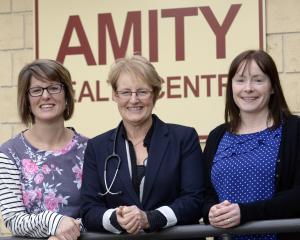Another 11 staff and five patients at Dunedin Hospital have fallen ill with suspected norovirus as the hospital continues to battle an outbreak of the highly infectious virus.
The hospital is still closed to visitors, but some outpatient clinics and a ward at Dunedin Hospital will reopen tomorrow.
More than 1600 appointments for elective surgery, outpatient visits and planned admissions have been postponed in the past two days as the hospital has been locked down in an attempt to contain the virus.
Almost 100 patients and staff have fallen prey to the virus since the first outbreak on Ward 5B two weeks ago.
Access to the hospital has been restricted since Saturday and visitors are being allowed in only in exceptional circumstances.
Visits to Wakari Hospital have also been restricted.
Operations manager Megan Boivin said the hospital was very concerned at the number of staff who had become ill in the past 24 hours.
"We very much regret the need to continue with this action, but we must protect our patients from illness and not expose others to illness, along with the impact on staffing levels in some areas."
Despite the restrictions, the hospital was still busy - it was in "code red" yesterday, which means 26 beds or less were free - but was coping despite the number of ill staff, Mrs Boivin said.
Restrictions would be removed as soon as the situation was under control.
Nurses interviewed said they were still busy, although the hospital seemed quieter than usual without visitors.
Some patients found it hard not being able to have visitors, they said.
Security staff are turning people away at the main entrance and only allowing in hospital personnel with identification. Rows of empty car parks on usually packed streets surrounded the hospital yesterday, suggesting people were getting the message to stay away.
The highly contagious virus has affected six wards since the first outbreak.
The Otago District Health Board believed it had the outbreak under control on Thursday, but restricted access on Friday when five wards became affected.
People requiring urgent hospital attention will continue to be seen at the hospital's emergency department, while those who need laboratory tests should go to other collection centres.
Medical centres in the city reported an inundation of calls from people worried about norovirus symptoms, but said viral illnesses, including both gastro and respiratory illnesses, had been widespread during the past months.
Mornington Health Centre practice manager Barbara Bridger said the centre had dealt with hundreds of people with viral illnesses in the past few weeks.
On Friday alone, about 50 people with gastro or flu-like symptoms visited a doctor or spoke to a nurse on the phone, she said.
The centre was encouraging people with norovirus-like symptoms to ring and talk to a nurse first before seeing a doctor. The symptoms of norovirus can include vomiting, diarrhoea, nausea and abdominal pains.
There was little doctors could do for viral illnesses other than tell a patient to stay in bed, drink lots of fluids and take pain and fever relief medication, she said.
Helensburgh Medical Centre practice nurse Liz King said the phone had been "ringing off the hook" with people thinking they had norovirus.
Viral illnesses, including gastro and respiratory illnesses, had been sweeping through families for the past two months, she said.
Mercy Hospital chief executive Mike Woodhouse said the private hospital was struggling with a higher than usual rate of cold and flu illnesses among staff, but there was no evidence of norovirus.
Staff were "hyper-aware" of the dangers and were being vigilant for the signs and symptoms of the highly contagious virus.
Hand-washing stations had been installed around the hospital.
No services had been postponed.
Urgent Doctors and Accident Centre practice manager Belinda Watkins said the centre had been busier than usual.
Staff were working closely with the Dunedin Hospital emergency department and had adopted its infection control policy.
Last month, 24 residents and five staff were affected by a suspected norovirus outbreak at a Dunedin rest-home.
Good hand washing is the most important way people can protect themselves from the spread of illness.
Hands should be washed thoroughly with soap and water for 20sec and then dried thoroughly with clean towels for 20sec.
Anybody with diarrhoea or vomiting should stay away from work or school until they have been free of all symptoms for 48 hours.
The Otago District Health Board community and public health advisory committee and disability support advisory committee meetings, which were to be held at Dunedin Hospital today, have been cancelled.











